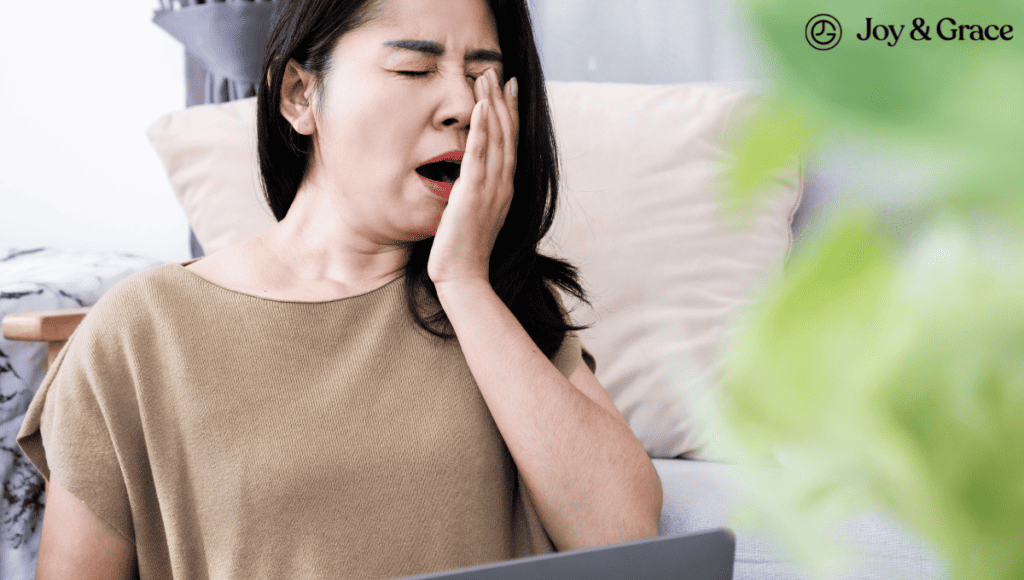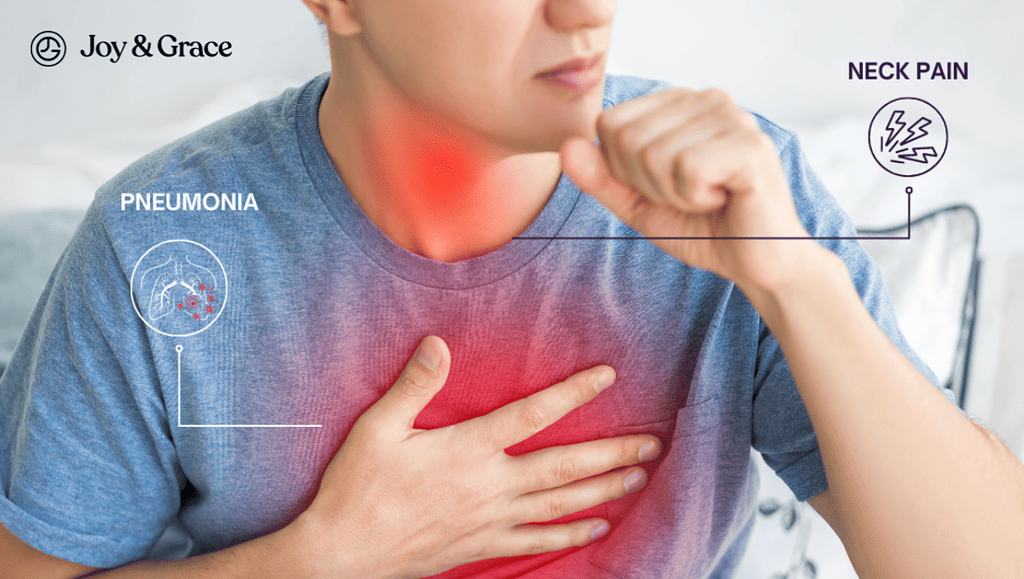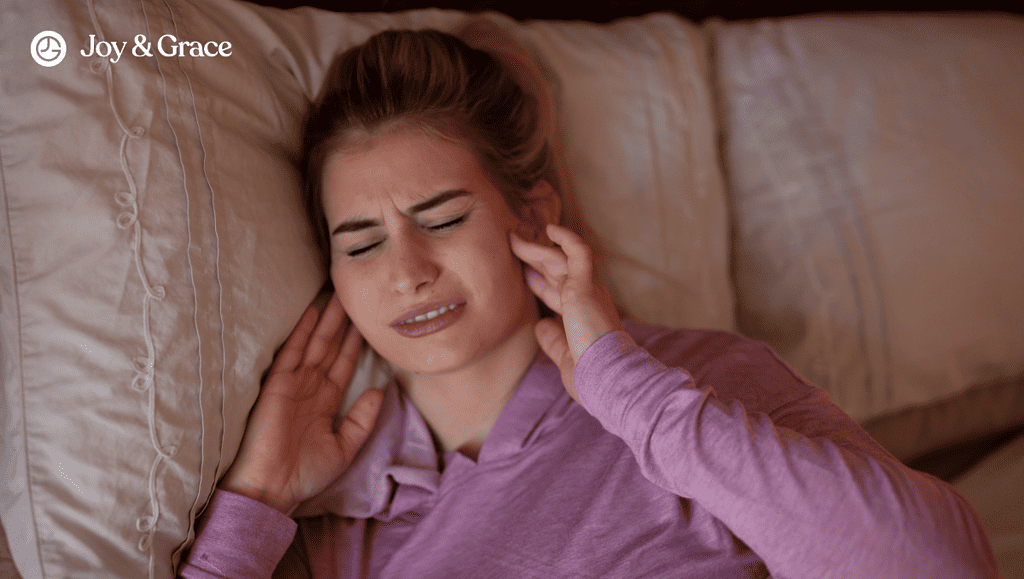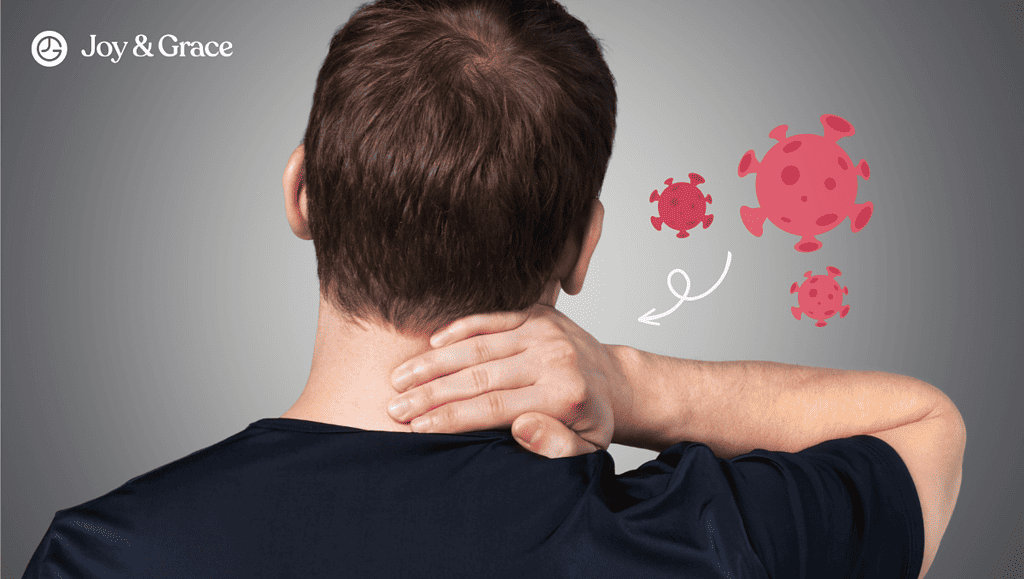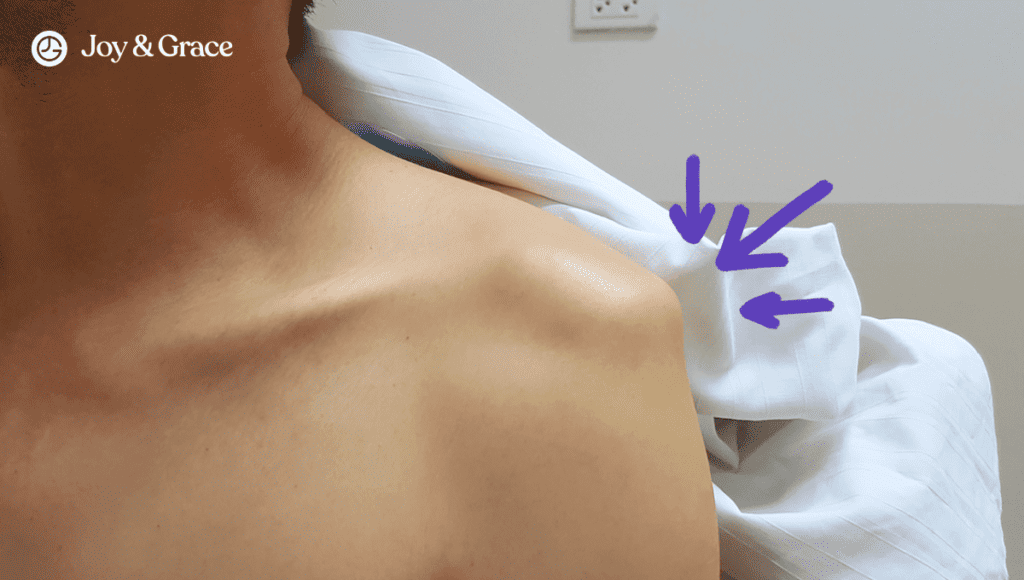Nothing feels quite as refreshing as a hearty yawn to shake off fatigue, right? But just as you instinctively yawn without paying too much attention to it, a sudden neck ache emerges. What on earth could be the cause?
Today, we're devoting our focus to neck pain after yawning, exploring the possible reasons and solutions.
Why Does Yawning Cause Neck Pain?
When you yawn, especially when lying in positions like on one side, the neck muscles might experience uneven tension. This can lead to a feeling of the muscles being momentarily "tightened" or "stretched" in an uncomfortable way, leading to pain.
Yawning can also trigger neck spasms or cervical muscle spasms, which are involuntary and sudden contractions of the muscles in the neck. These spasms usually cause a short, crampy pain that usually goes away fast.
That said, yawning itself typically does not cause long-term or severe neck pain.
If you experience persistent pain, the following could be some potential underlying causes to consider:
- Pre-existing neck strains
Yawning can worsen pain from any pre-existing neck muscle injuries. Yawning involves the stretching of various neck muscles. If these muscles are already tense or strained, the additional stretching during a yawn can cause pain.
- Joint Issues
If you have problems with the joints in your neck, such as arthritis or temporomandibular joint (TMJ) disorders, the movement of your neck during a yawn may put pressure on these joints.
- Nerve Compression
Yawning can sometimes cause sudden movements or jerks, which can compress or irritate nerves in your neck, resulting in pain.
- Migraines
According to a study, some patients repeatedly yawn during migraine attacks, which can be a warning sign or accompanying symptom of migraines. Repeated yawning can put you at risk of developing muscle tension in the neck. Not only that, migraines can also cause neck pain.
Bonus Info: Pain from yawning without any known cause is termed primary yawning pain.
Primary yawning pains are usually cephalic in location, meaning the pain is mainly located in the head. If another condition causes pain when yawning, it’s termed secondary yawning pain.
Yawning is not known to be a direct cause of neck pain. When yawning causes pain outside of the head, it’s called extracephalic yawning pain.
Can Yawning Cause Neck And Shoulder Pain?
As we discussed, yawning can occasionally lead to discomfort in the neck due to the activation of surrounding neck muscles. However, the shoulder is a bit further away.
So, if you're experiencing shoulder pain when yawning, it might suggest a broader underlying issue, possibly related to nerves. For instance, a pinched nerve in the neck could radiate pain to the shoulder.
The quality of this pain is often sharp or burning, making it distinct from regular muscle aches.
On the other hand, if the pain feels more like a muscle ache, another potential cause could be an existing shoulder condition. A particularly intense yawn might tense up the shoulder muscles, exacerbating the discomfort.
In rare cases, the impact of yawning on pain can be particularly pronounced.
For instance, a 45-year-old man suffered from recurrent and intense pain in his right shoulder and arm for two years. Oddly, yawning caused these pain episodes and made spontaneous breathing difficult.
The patient underwent a thorough medical evaluation, but the cause remained unknown.
Why Does My Neck Hurt When I Turn My Head And Yawn?
Aside from the conditions we mentioned above, neck pain after yawning and turning your head may be due to what are called anterior cervical pain syndromes (ACPS).
ACPS is a set of medical conditions that cause pain in the front part of the neck. The mechanism of ACPS is currently unknown, and most of them are extremely rare.
Examples of anterior cervical pain syndromes include:
Carotidynia, also known as Fay syndrome, is characterized by pain or tenderness in one side of the neck. It frequently comes with a throbbing or pulsating sensation. Yawning and head movement can worsen the pain.
Eagle's syndrome is characterized by throat and neck pain caused by an unusually long styloid process. The styloid process is a pointy bone structure in your neck. It sticks out like a thin, bony finger from the base of your skull, just below your ear. Its main job is to provide support and attachment points for muscles and ligaments in your throat and neck.
- Superior laryngeal syndrome
Superior laryngeal syndrome involves throat pain due to irritation or compression of the superior laryngeal nerve when yawning or swallowing. The superior laryngeal nerve is a small but important nerve in your neck. It plays a role in controlling some of the muscles for swallowing and voice production.
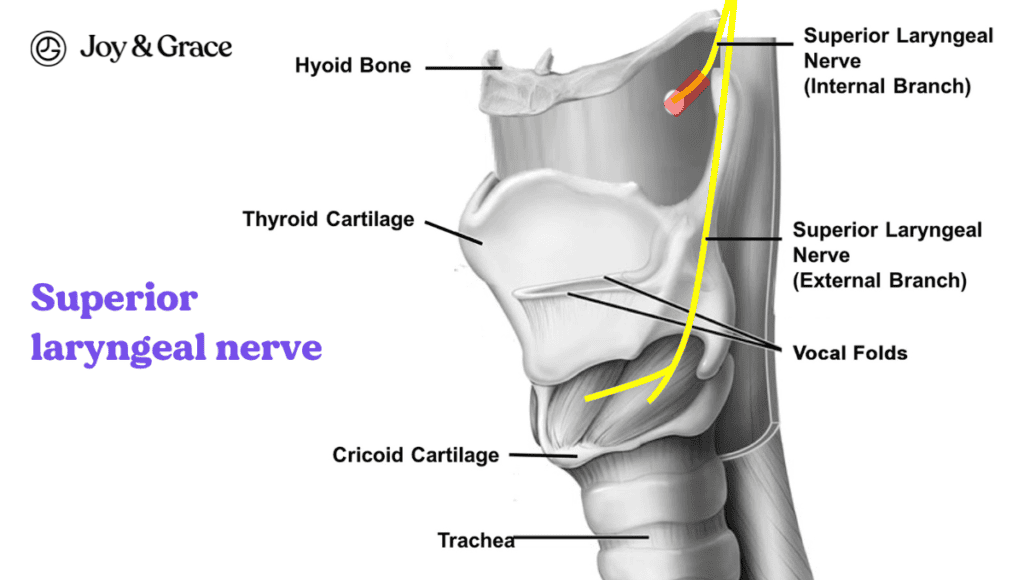
- Hyoid bone syndrome
Hyoid bone syndrome is neck pain centered around the U-shaped hyoid bone. Hyoid bone syndrome is often due to trauma to the hyoid bone (the bone just above the “Adam’s Apple”).
- Superior thyroid cornu syndrome
Superior thyroid cornu syndrome is neck pain caused by a bony protrusion in the thyroid cartilage. The pain may be aggravated during yawning due to throat movement.
According to a study, 56% of patients with anterior cervical pain syndrome had neck pain upon yawning or head turning. Other symptoms included:
- Tenderness
- Pain when talking
- Hoarse voice
- Pain when chewing
- Foreign body sensation in the neck
Why Does The Side Of My Neck Hurt When I Yawn?
Pain at the side of your neck when yawning is most likely due to muscle tension triggered by the stretching of your neck muscles.
That said, in extremely rare instances, pain at the side of the neck after yawning may be due to Eagle’s syndrome, a condition previously discussed that involves the elongated styloid process under the side of your skull.
According to an article, Eagle’s syndrome should be considered if you have a fractured styloid process. Styloid fractures are extremely rare and can be due to yawning or trauma.
Why Do My Neck And Jaw Cramp When I Yawn?
Again, this is most likely due to muscle tension. Not only does yawning stretch your neck muscles, but it can also stretch various facial muscles too, including the jaw muscles.
Another possible cause of neck and jaw cramps or spasms after yawning is temporomandibular joint (TMJ) disorder. This condition affects the joint that connects your jaw to the side of your head. The pain from TMJ disorders can travel to the neck and may be worse when yawning.
If the following symptoms are present along with your neck pain and cramping, TMJ may be the cause:
- Jaw pain
- Difficulty chewing
- Locking sensation in your jaw
Why Does My Neck Gland Hurt When I Yawn?
"Neck glands" is not a specific medical term, but it is often used informally to refer to lymph nodes in the neck.
Lymph nodes are small, bean-shaped structures that are part of the lymphatic system, which is a vital part of the immune system. Lymph nodes are found throughout the body, including in the neck.
Health conditions like tonsillitis or pharyngitis, which result in swollen lymph nodes, could also lead to pain during yawning. These conditions typically don’t cause neck pain. However, some people might mistake the sore throat that results from these conditions for neck pain.
Other common symptoms of these conditions include:
- Fever
- Chills
- Hoarse voice
- Difficulty swallowing
- Swollen and red tonsils
Why Does My Neck Hurt When I Yawn And Swallow?
Neck pain when yawning and swallowing often arises from strained neck muscles. These actions can stress the muscles further, leading to increased discomfort.
- In rarer cases, a possible cause of neck pain when yawning and swallowing is a thyroid mass.
The thyroid gland is another gland found in your neck area. This gland is responsible for controlling numerous metabolic processes in your body. Thyroid masses have been known to cause difficulty or pain when swallowing and, apparently, neck pain when yawning, too.
For instance, there’s a medical report about an 84-year-old woman who suffered from pain at the front of her neck when she yawned. Upon medical evaluation, a lump was found on the upper right side of her thyroid gland. According to the case report, the pain was localized within the thyroid area. - In even rarer cases, the pain upon swallowing can also be due to anterior cervical pain syndrome (ACPS). In the study about ACPS we mentioned earlier, 56% of patients also had neck pain when swallowing.

While many of these conditions may resolve on their own, it's crucial to keep an eye on any persistent symptoms. For peace of mind and optimal health, consider consulting with a medical professional if concerns persist.
What Can I Do For Neck Pain When Yawning?
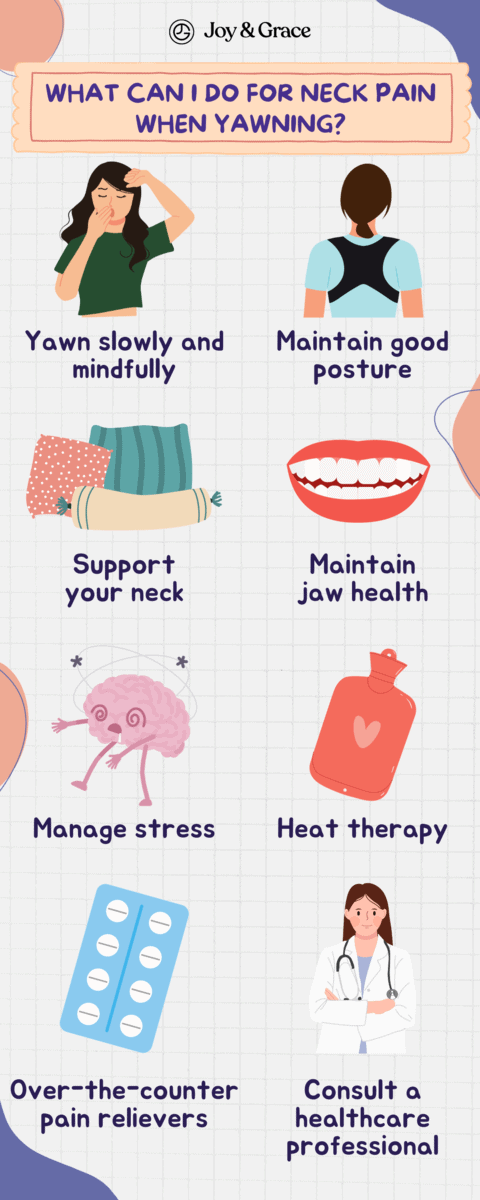
Experiencing neck pain when yawning can be uncomfortable. However, there are several things you can do to relieve or prevent this discomfort. Here are some strategies to consider:
- Yawn slowly and mindfully
Try to control the speed and intensity of your yawns. Yawning too forcefully or quickly can strain neck muscles. Take slow, deep breaths during a yawn to minimize the strain.
- Maintain good posture
Sit or stand up straight to keep your neck and spine aligned. Poor posture can contribute to tense muscles and neck pain.
- Support your neck
Use a pillow that provides adequate neck support when sleeping or resting. A cervical pillow or memory foam pillow can help maintain proper neck alignment.
- Maintain jaw health
Jaw problems can contribute to neck pain during yawning. If you have issues with your jaw, consider consulting a dentist or specialist for evaluation and treatment.
- Manage stress
Stress and tension can exacerbate neck pain. Practice stress-reduction techniques such as deep breathing exercises or yoga to relax your muscles.
- Heat Therapy
Utilizing heat therapy can relax tense neck muscles, potentially reducing the likelihood of experiencing pain when yawning.
- Over-the-counter pain relievers
Non-prescription pain relievers can provide temporary relief from neck pain. Always follow the recommended dosage instructions.
- Consult a healthcare professional.
If your neck pain persists or worsens despite trying these self-care measures, consult a healthcare provider. They can evaluate your condition and recommend appropriate treatments.
How Do Doctors Treat Anterior Cervical Pain Syndromes?
The treatment of anterior cervical pain syndromes depends on the underlying cause. Here are some common treatment approaches:
Medications
- Nonsteroidal Anti-Inflammatory Drugs (NSAIDs)
These over-the-counter or prescription medications can reduce pain and inflammation.
- Muscle Relaxants
If muscle tension is contributing to the pain, muscle relaxants may help.
Injections
- Epidural steroid injections and nerve blocks
These injections deliver anti-inflammatory steroids directly to the affected area, providing relief from pain and inflammation, especially when nerve compression is involved (such as in spinal stenosis).
In a study, 24 patients received injections of 0.25% bupivacaine (a local anesthetic) and 10 mg/mL dexamethasone (a steroid). 12 out of the 24 patients (50%) had a complete response to the injection. This means their pain went away completely, either temporarily or permanently.
Among those who had a complete response, six of them (50%) had permanent relief from their pain. A total of 19 out of the 24 patients (79.2%) experienced at least some improvement in their pain due to the injection, even if it wasn't a complete relief.
Surgery
In some cases where conservative treatments are ineffective or when there is a structural issue causing the pain, surgery may be necessary.
According to the study we referenced earlier, six patients had partial relief of symptoms after surgery. Meanwhile, two patients had complete relief of symptoms.
Takeaway
Yawning itself is a natural reflex that typically doesn't cause neck pain. If you do experience pain from yawning, it’s most likely due to:
- Muscle tension
- Pre-existing neck strains
- Nerve compression
- Joint issues
- Migraine
However, certain rare conditions can lead to discomfort or even severe pain during a yawn. So, while an occasional pain during a yawn might not be cause for alarm, persistent pain could be a sign that something more significant is at play.
Strategies for relief and prevention can include something as simple as yawning slowly and mindfully. However, you may need the help of a healthcare professional if your pain is from something more serious.
